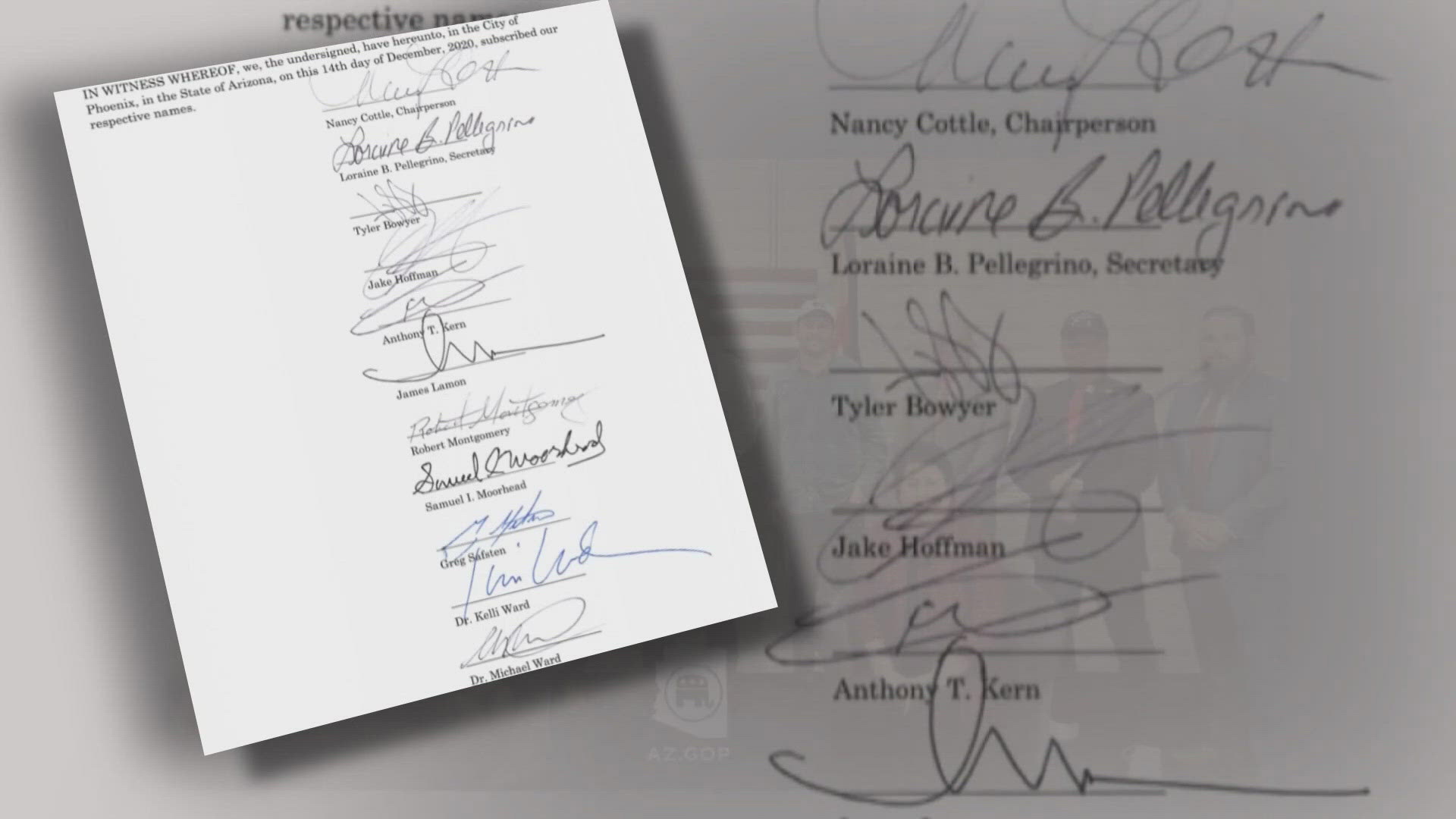PHOENIX — A former attorney for Donald Trump whose legal theory underpinned attempts to overturn Trump's 2020 election defeat pleaded not guilty Friday to nine felony charges connected to the Arizona "fake electors" scheme.
A defiant John C. Eastman told reporters outside Maricopa County Superior Court that he had "zero involvement" in the scheme.
"I had zero communications with the electors in Arizona, zero involvement in any of the election litigation in Arizona or legislative hearings," Eastman said. "I'm confident that with the laws faithfully applied, I will be fully exonerated at the end of this process."
Eastman is the first of 18 defendants to be arraigned in Arizona's "fake electors" case. All will enter not guilty pleas.
Eastman's trial date was set for Oct. 10, but his attorney, Ashley Adams, said she expected the date to be pushed back.
Eleven of the remaining defendants will show up either in person or virtually for their arraignments at 8:30 a.m. Tuesday.
Five others have been granted extensions until later in May or June.
The last defendant, Rudy Giuliani, was served Friday night.
What was the 'fake electors' scheme?
The alleged scheme was an illegally coordinated attempt by Trump's allies to overturn his defeat in Arizona's 2020 presidential election, potentially erasing the ballots cast by 1.7 million people.
On Dec. 14, 2020, one month after the election, the state's 11 Trump electors gathered at Arizona Republican Party headquarters to sign a document that purported to declare them Arizona's legal electors.
The party posted video of the signing on social media.
Democrat Joe Biden had won the election. His electors were certified the same day.
According to the indictment: "The defendants... schemed to prevent the lawful transfer of the presidency to keep (Donald Trump) in office against the will of Arizona voters."
Arizona was one of seven battleground states targeted by Trump allies after he lost the 2020 vote.
Who is John Eastman?
Eastman is a 64-year-old conservative law professor and former Trump lawyer who was the father of the fake elector scheme, according to court documents.
Almost four years after the presidential election, Eastman finds himself in a legal and professional quagmire.
He promoted a controversial legal theory that the vice president could determine the winner of a presidential election.
The fake elector scheme could have disrupted the electoral college count by Vice President Mike Pence on Jan. 6, 2021, possibly putting the election result in the hands of the Republican-controlled House or Republican-controlled legislatures in the affected states.
Retired Federal Appeals Court Judge Michael Luttig, a widely respected conservative jurist who had Eastman as a law clerk, told the House Jan. 6 select committee that Eastman’s theory would have been “tantamount to a revolution within a constitutional crisis in America.”
Among Eastman's woes:
- Last September, in a Georgia case that mirrors Arizona's, Eastman was indicted on nine felony charges in Fulton County for his alleged role in a fake elector scheme.
- Eastman is an unindicted co-conspirator in the federal criminal case against Trump that stems from his attempts to remain in power after the 2020 election.
- He faces the loss of his law license in California.
Eastman's apparent attempt to reverse the Arizona vote included putting pressure on then-House Speaker Rusty Bowers during a phone call on Jan. 4, 2021, two days before Congress was to certify the 2020 election results.
Who's been charged?
Democratic Attorney General Kris Mayes obtained indictments last month against 18 people, on nine felony counts each of forgery, fraud and conspiracy.
Eleven of the defendants were Trump electors in 2020 who declared themselves the duly elected Arizona electors on a document that purported to be official.
Among the phony electors are two elected officials -- State Sens. Jake Hoffman of Queen Creek and Anthony Kern of Glendale -- and the former chairwoman of the Arizona Republican Party, Kelli Ward.
The seven other defendants were Trump allies, including his chief of staff, Mark Meadows.
Where's Rudy Giuliani?
The last public sighting of Giuliani in Arizona was three weeks after the 2020 election. He spread falsehoods about the election at an 11-hour gathering in a Phoenix hotel ballroom.
(Giuliani may have spread COVID-19 in the ballroom. The Legislature had to shut down for a week out of concern that about 15 Republican lawmakers had been exposed.)
AG Mayes' office has made several attempts to serve Giuliani with a summons to appear in a Phoenix courtroom next week.
Giuliani's been unreachable, but he's not in hiding.
On new nightly broadcasts this week on X, the site formerly known as Twitter, Giuliani has revealed that he's now in Florida.
'There's an easy way and a hard way'
"They could have an arrest warrant issued, and he could be arrested ... and brought forcibly to Arizona," said Mark Kokanovich, a former federal prosecutor.
"That happens sometimes. It's not the usual course in these white-collar cases, but that's one of the options."
The former lawyer for Donald Trump is charged with nine felonies in Arizona for his alleged role in the fake electors scheme.
Kokanovich said Giuliani's lawyer could also accept the summons.
"There's an easy way to do this and a hard way to do this," Kokanovich said.
"Most everyone prefers the easy way."
A Mayes spokesman told 12News that her office would likely wait until next week before exploring other options to serve Giuliani.
Up to Speed
Catch up on the latest news and stories on the 12News YouTube channel. Subscribe today.

